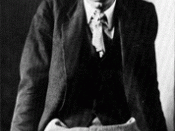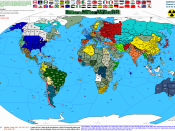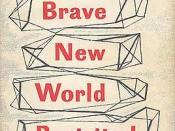Brave New World and Fahrenheit 451 are two novels, both set in the future, which have numerous similarities throughout them. Of all their common factors, those that stand out most would have to be: first, the outlawed reading of books; second, the superficial preservation of beauty and happiness; and third, the theme of the protagonist as being a loner or an outcast from society because of his differences in beliefs as opposed to the norm. Both Ray Bradbury and Aldous Huxley argue that when a society attempts to create a utopia through excessive control over its citizens, the result will be destructive behavior and the ultimate downfall of that society. Bradbury and Huxley warn society of a future where people's lives are controlled by advanced technologies, little value placed on the importance of relationships between people, and the ban on free intellectual thought.
The concept of outlawed reading in most of Western society, today, would be very strange and unacceptable.
In both novels the banning of books is a common and almost completely unquestioned law. In Brave New World reading is something that all classes of people are adversely conditioned against from birth. In the very beginning of the novel a group of infants are given bright, attractive books but are exposed to an explosion and a shrieking siren when they reach out for them. This negative conditioning thus prevents them from wanting the books and causes them to scream and shrink away in horror at the mere sight of the books. In reference to the accomplishment of this conditioning, the Director says: "Books and loud noises...already in the infant mind these couples are compromisingly linked; and after two hundred repetitions of the same or a similar lesson would be wedded indissoluble. What man has joined, nature is powerless to...


